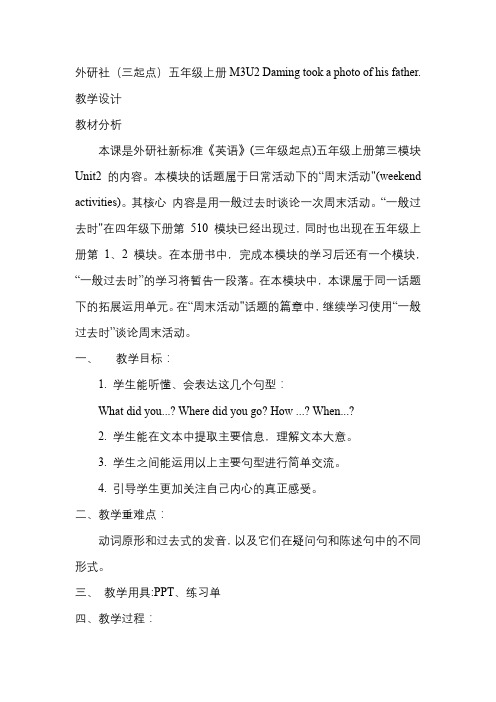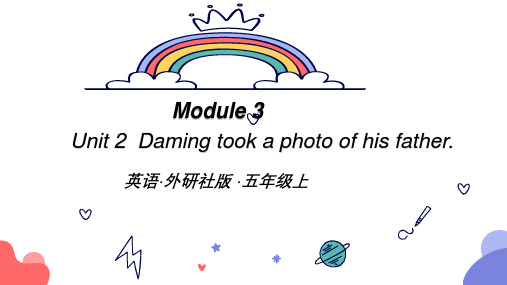外研社英语(三起)五年级上册Module3
外研社五年级英语上册Module3《Where did you go?》教案新部编本

教师学科教案[ 20 – 20 学年度第__学期]任教学科:_____________任教年级:_____________任教老师:_____________xx市实验学校Module3 Unit1 Where did you go?教学内容:SB(学生用书)和AB(课堂活动用书)学习任务:Where\How\When\What did …?运用任务:1做练习2听录音,做练习3调查父母年轻时的衣食住行情况,做练习.4教师要求学生进行一次去年夏天活动的调查教学程序:1热身复习。
教师播放第一模块中学过的歌曲录音,学生跟唱。
教师请学生说出歌词中出现了哪些动词,学生说出,教师写在黑板上。
教师请学生将动词原形与动词过去式分开,并将对应的原形与过去式连线。
"do -did go-went see-saw meet -met,buy-bought,have -had"2课文导入教师与学生交流,给学生讲述自己做了一个梦。
如:”Last night I had a dream”边说边把两只手相叠放在耳边,头侧歪,闭上眼睛作出睡觉的动作。
接着教师说:“In my dream I went to the Grea t Wall. It was very beautiful.And Imet DaMing and his father there.We were very happy.”教师说时带动作,让学生明白教师的梦是什么样的.3课文教学请学生把书打开Unit 2 ,观察课文的插图,提问学生:“What can you see?”教师请学生完整听一遍课文录音,整体感知课文.教师通过使用钟表来演示时间,使学生理解"hour"四人一组做练习,每人选择课文中的一个句子写在一张纸.写完后,全组共同检查一下,补充没有写出的句子.4. 任务完成.教师要求学生进行一次去年夏天活动的调查,然后拿出为学生准备的一份调查表,如下:QuestionNameWhere did you go last summer?When did you go?How did you go?What did you do?教师将调查表发给班里的每一个学生,然后拿一份空白表找学会上做示范,并填出相应的内容.。
外研社英语五年级上册Module3单元知识汇总

Module3一、核心词汇1.名词:weekend周末place地方museum博物馆trip旅行,旅程river河,江hour小时minute分钟wall墙,城墙mountain 山plant植物British英国人2.动词:took(take的过去式)搭乘,乘坐(交通工具);需要花费(一定时间) arrive到达3.形容词:British英国的,英国人的best最4.副词:how如何,怎样along沿着5.数词:twenty二十6.介词:of关于……的,表明……的for达,计with拥有,具有二、拓展词汇1.名词短语:The British Museum大英博物馆Big Ben大本钟the London Eye伦敦眼The Great Wall长城2.方位短语:at the weekend在周末in the sea在海洋里3.动词短语:see monkeys看猴子take photos照相4.形容词短语:lots of许多的5.表示出行方式的短语:by bus乘公共汽车by plane乘飞机by train乘火车三、核心句型1.—What did you do at the weekend?你们在周末做了什么?—We visited lots of places.我们参观了许多地方。
—Where did you go?你们去了哪里?—We went to the British Museum.我们去了大英博物馆。
解读:这两个句子是一般过去时态的特殊疑问句。
助动词用“did”,did后跟动词原形;答语中谓语动词用一般过去时态,“visited和went”就是“visit”和“go”的过去式形式。
举一反三:—What did you do yesterday?昨天你做了什么?—I watched TV in the living room.我在客厅里看电视了。
—What did you do last Sunday?你上周日做了什么?—I washed clothes for my mother.我帮我的妈妈洗衣服了。
外研社三年级起点英语五年级上册m3-Unit-1-Where-did-you-go

• A: Where did you go on your summer holiday? • B: I ……
• A: What did you do on summer holiday? • I stayed at home/…
Where did Amy go on vacation?
• 伊丽莎白塔(Elizabeth Tower),旧称大本钟(Big Ben),即威斯敏斯特宫钟 塔,世界上著名的哥特式建筑之一,英国国会会议厅附属的钟楼(Clock Tower)的大报时钟。伊丽莎白塔于1858年4月10日建成,是英国最大的钟。 坐落在英国伦敦泰晤士河畔,是伦敦的标志性建筑之一。钟楼高95米,钟直 径7米,重13.5吨。每15分钟响一次,敲响威斯敏斯特钟声
practice Where did you go? I visited lots of places. I went to …
绿色圃中小学教育 绿色圃中学资源网 绿色圃中小学教育 绿色圃中学资源网
• 伦敦眼(The London Eye),坐落在英国伦敦泰晤士河畔,是世
界上首座、同时截至2005年最大的观景摩天轮,为伦敦的地标及 出名旅游观光点之一。伦敦眼于1999年年底开幕,为庆祝新千年 而建造,因此又称"千禧摩天轮“.总高度135米(443英尺)。伦敦 眼共有32个乘坐舱(由序号1排列到33。因为宗教忌讳,没有13 号)。每个乘坐舱可载客约25名,回转速度约为每秒0.26米,即 一圈需时30分钟。乘客可以乘坐"伦敦眼"升上半空,鸟瞰伦敦。
外研社(三年级起)小学英语五年级上册 单词表(含音标)

外研社小学英语(三年级起点) 五年级上册单词表五年级上册单词表Module 1met[met]above[əˈbʌv]ground[graʊnd]those[ðəʊz]ice cream [ais kri:m]us[əs]finish['finiʃ]wait[weit]hurry ['hʌri]hurry up[ˈhʌri ʌp]dropped[drɔpt]send[send]email['i:meil]ran [ræn]love[lʌv]Module 2list [list]er[ɜ:(r)] ]need [ni:d]first[fɜ:st]can [kæn]lost[lɔst ]how much[hau mʌtʃ]cheese[tʃi:z]any ['eni]use[ju:s]over there[ˈəuvə ðɛə]bottle['bɒtl]half[hɑ:f]kilo ['ki:ləʊ] a lot of [ə lɔt ɔv]Module 3 weekend[wi:k'end] place[pleis] British [ˈbritiʃ] museum[mjuˈzi:əm] how [haʊ]best[best]took [tʊk]trip[trip] along [əˈlɔŋ]river ['rivə (r)] hour['aʊə (r)] twenty[ˈtwenti] minute['minit] of [əv]wall[wɔ:l] arrive [ə'raiv]for[fə(r)] mountain ['maʊntən] with[wið]plant [plɑ:nt]Module 4 pair[peə(r)] shorts[ʃɔ:ts] argue ['ɑ:ɡju:] matter ['mætə (r)] took[tʊk]wear [weə (r)] sports [spɔ:ts] hey [hei]Module 5 nineteen [nainˈti:n]crayon ['kreiən]fifteen [fifˈti:n]begin[bi'ɡin] give out [ɡiv aut] all right[ɔ:l rait] thirteen [θɜ:'ti:n] fourteen[fɔ:ˈti:n] sixteen[siksˈti:n] seventeen [sevnˈti:n] eighteen [eiˈti:n]floor[flɔ:(r)]forty ['fɔ:ti] number[ˈnʌmbə(r)] thirty ['θɜ:ti]fifty['fifti]sixty['siksti] seventy[ˈsevnti]eighty['eiti]ninety ['nainti] happily [ˈhæpili]many['meni]Module 6 well[wel]team [ti:m]really[ˈri:əli] good at[ɡud æt]catch[kætʃ] goalkeeper [ˈgəʊlki:pə(r)] think[θiŋk] fantastic [fænˈtæstik] fan[fæn]past[pɑ:st]swan [swɒn]slow[sləʊ] healthy [ˈhelθi]Module 7a lot [ə lɔt]useful[ˈju:sfl]show[ʃəʊ] presenter [priˈzentə(r)] blind[blaind]deaf[def]hear [hiə(r)]her[hə(r)]fire['faiə(r)] firefighter [ˈfaiəfaitə(r)] hot dog[hɔt dɔg]*sausage[ˈsɔsidʒ] kind[kaind]Module 8 time[taim]school [sku:l]start[stɑ:t]past[pɑ:st]late[leit] exercise['eksəsaiz] playground ['pleiɡraʊnd] before[biˈfɔ:]join[dʒɔɪn] skipping rope [skɪpɪŋ] [rəʊp] coffee [ˈkɔfi]tea [ti:]always['ɔ:lweiz]bell[bel]rang[ræŋ]into['intə]Module 9 feel[fi:l]bored[bɔ:d]sad[sæd]woof[wʊf]miss[mis]angry ['æŋɡri]ill [il]told [təʊld]better['betə(r)]farm[fɑ:m]tired['taiəd]won [wʌn]ruler [ˈru:lə(r)]smell [smel]Module 10 kitchen ['kitʃin]toilet['tɔilət]room [ru:m] living room [ˈliviŋ ru:m] hide-and-seek [haid nˈsi:k] now[naʊ]last[lɑ:st]hide[haid]sofa ['səʊfə]shout [ʃaʊt]grass [ɡrɑ:s]baby['beibi] dangerous[ˈdeindʒərəs]五年级上册单词表表(meet过去式)碰上,遇见在.....上方,在.....之上地面那些冰激凌(宾格)我们吃完,喝完,用尽等待,等候赶紧,匆忙赶紧,赶快(drop过去式)(无意中)使掉落发送,寄电子邮件(run的过去式) 跑爱你的清单哦,嗯,呃需要首先,第一,最先的,第1(次)的可以(lose的过去式)丢失多少(用于不可数名词)奶酪一些,一点,若干使用在那边瓶子;一瓶的容量一半千克,公斤许多的周末地方英国的,英国人的,英国人博物馆如何,怎样最(take的过去式)搭乘,乘坐(交通工具)旅行,旅程沿着河,江小时二十分钟关于......的,表明......的墙,城墙到达达,计山拥有,具有植物一套,一双,一副(常复)短裤争论,争吵问题,麻烦(take的过去式)拿(走),取(走)穿体育运动的,体育运动用的嘿,喂十九蜡笔十五开始分发好,行十三十四十六十七十八地面,地板四十数字三十五十六十七十八十九十幸福地,愉快地许多,很多好,熟练地运动队,球队很,非常擅长抓住,接住守门员想,认为极好的狂热仰慕者,迷过去(swim的过去式)游泳慢的健康的许多,大量有用的(电视或广播)节目(电视或广播节目的)主持人 失明的,瞎的失聪的,聋的听到(宾格)她火灾,失火消防队员热狗香肠友好的,善意的,体贴的时刻,时候,时间上课时间,上学时间开始,发生晚于,过(几点)迟到的运动,锻炼操场在……之前加入,参加跳绳咖啡茶总是,一直钟,铃(ring过去式)鸣,响进入......里面感觉,觉得厌烦的,厌倦的伤心的,难过的(狗发出的)吠声想念生气的,愤怒的有病的,不健康的(tell的过去式)告诉痊愈的,恢复健康的农场累的,疲劳的(win的过去式)赢,获胜直尺闻出,嗅出厨房厕所,卫生间,房间起居室,客厅捉迷藏好,哦最后躲,躲藏沙发呼喊,大叫草,草地婴儿危险的。
五年级上册英语教案-ReviewModule∣外研社(三起)

五年级上册英语教案Review Module∣外研社(三起)教学内容:本节课为五年级上册英语《外研社(三起)》教材的复习模块,教学内容包括前三个模块的核心词汇、句型和语法。
通过对这些知识点的复习,帮助学生巩固所学内容,提高英语运用能力。
教学目标:1. 知识与技能:使学生能够熟练掌握前三模块的核心词汇、句型和语法,并能运用所学知识进行简单的英语交流。
2. 过程与方法:通过讲解、练习、游戏等多种教学方法,激发学生的学习兴趣,提高他们的英语实际运用能力。
3. 情感态度与价值观:培养学生合作意识,提高他们学习英语的自信心,激发他们学习英语的兴趣。
教学难点:1. 各模块重点词汇、句型的掌握。
2. 句型在实际场景中的运用。
3. 语法知识的理解与应用。
教具学具准备:1. 教师准备PPT课件,包含本节课所需的教学内容。
2. 学生准备教材、笔记本、文具等学习用品。
3. 准备一些实物教具,如图片、卡片等,以便进行直观教学。
教学过程:1. 导入a. 跟唱英文歌曲,营造英语学习氛围。
b. 复习前三模块的核心词汇,检查学生的掌握情况。
2. 新课内容展示a. 通过PPT展示本节课的主要教学内容,包括词汇、句型和语法。
b. 讲解重点词汇、句型,并进行现场示范。
c. 引导学生进行句型练习,加强他们对知识点的掌握。
3. 小组活动a. 学生分组,每组选择一个场景,用所学句型进行交流。
b. 教师巡回指导,纠正发音和语法错误。
4. 语法讲解与练习a. 讲解本节课涉及的语法知识,帮助学生理解。
b. 给出例句,让学生进行模仿练习。
c. 完成练习题,检验学生的掌握情况。
5. 课堂小结b. 强调学生在课后需要加强练习的部分。
板书设计:1. 核心词汇:在黑板上列出本节课的核心词汇,方便学生记忆。
2. 句型:列出重点句型,并给出示例。
3. 语法:简要介绍本节课涉及的语法知识,以便学生理解。
作业设计:1. 抄写本节课的核心词汇,加强记忆。
2. 根据所学句型,编写一段简单的英语对话。
外研社(三年级起点)小学五年级英语module3unit2Sam_ate_six_hamburgers[1]
![外研社(三年级起点)小学五年级英语module3unit2Sam_ate_six_hamburgers[1]](https://img.taocdn.com/s3/m/35de53faf705cc1755270911.png)
Food / Drink
Food:
1.noodles\rice\ Water\tea\ dumplings\bread juice\ \meat\fish coffee\cola 2.hamburger\ (healthy diet) sausage\cheese\
Ask and answer (Yes/No)
N 1.Daming wrote a letter to Amy. Y 2.Sam likes hamburgers very much. N 3.Lingling ate six sandwiches. Y 4.Lingling and Amy gave hamburgers to Sam. N 5.Sam ate seven hamburgers. N 6.Lingling misses Chinese food. Y 7.Ms Smart is going to cook Chinese food tonight. .
1.
What did Sam _____at school today? (eat/ ate)
eat
Exercises:
2. 3. 4. 5. 6. 7. 8. 9.
Sam ate _____ six hamburgers today (eat/ ate). ate I ____ meat for lunch yesterday. (eat/ ate) What did he drink last night? (drink/ drank) _____ likes Sam _____ hamburgers very much. (like/ likes) Mum is going to cook fish tonight. (cook/ cooks) _____ have What is Lingling going to ____ tonight( have/has)? has He _____ got an apple. (has/ have) drank I _____ milk last night. (drink/ drank)
Module3Unit2Damingtookaphotoofhisfather.(教学设计)英语五年

外研社(三起点)五年级上册M3U2 Daming took a photo of his father.教学设计教材分析本课是外研社新标准《英语》(三年级起点)五年级上册第三模块Unit2 的内容。
本模块的话题属于日常活动下的“周末活动"(weekend activities)。
其核心内容是用一般过去时谈论一次周末活动。
“一般过去时"在四年级下册第510 模块已经出现过,同时也出现在五年级上册第1、2 模块。
在本册书中,完成本模块的学习后还有一个模块,“一般过去时”的学习将暂告一段落。
在本模块中,本课属于同一话题下的拓展运用单元。
在“周末活动"话题的篇章中,继续学习使用“一般过去时”谈论周末活动。
一、教学目标:1. 学生能听懂、会表达这几个句型:What did you...? Where did you go? How ...? When...?2. 学生能在文本中提取主要信息,理解文本大意。
3. 学生之间能运用以上主要句型进行简单交流。
4. 引导学生更加关注自己内心的真正感受。
二、教学重难点:动词原形和过去式的发音,以及它们在疑问句和陈述句中的不同形式。
三、教学用具:PPT、练习单四、教学过程:Review Match photos (ad) with the phrases.T:Let’s look at these pictures and phrases, please think it and match them. Students think about it about 1 minute, I ask 2 or 3 kids to answer it.2.Sing a song and think the questionsT: Let’s sing a song and think four questions:(1) Where did Lingling go?(2) What did Lingling see?(3)Who did Lingling meet in London?(4)What did Lingling buy?The students listen and think.Ask 4 students to answer these questions.3.Watch and thinkWatch the four pictures and think “What are they doing in pictures?”Ask 1 or 2 students to answer this question.And “What are they saying?” Show them four sentences:(1) No, this is Daming. And I took it.(2) Daming did. He’s my friend.(3) Who took this picture?(4) Did Daming take this one too? Put them in order.5. Watch and readWatch the video and read the text.6. Work in Pairs and discussDaming and his father went to the Great Wall at the weekend.T:Please watch the video and talk about the four questions. After watching, they discuss in pairs. Then answer the questions.7. Think and answer“When did they arrive there?”Review the time.8. Watch and answerWatch the video about Badaling. And answer the question“What did they do?”9. Mind mapDaming’s tripwherethe Great Wallhowby buswhenat 10 o’clock in the morningwhatwalked, took pictures10. Make a survey of tripsAsk three students for three questions:“Where did you go in the summer holiday?”“How did you go there?”“What did you do there?”11. Enjoy a story“A road trip”Think:1.Were you happy when you were in the trip?2.What were you interested in when you were in the trip?12.Homework①.Write a passage with your summer holiday?②.Talk about your trip with your friends or your classmates 评测练习一、选择(每题2 分,共10 分)( )1.Daming took a photo _________his father.A.inB.( )2.Then they walked ________one hour.A. forB.inC. on( )3.There are sixty minutes in ________hour.A. aB.anC. the( )4.They went _______bus to Badaling.( )5.They went there _______morning.A. thisB.inC. on二、按要求写单词(每题2 分,共12 分)1.short___________(反义词)2.here_____________(反义词)3.photo_________(复数)4.mountain__________(复数)5.take__________(过去式)6.walk___________(过去式)三、选词填空(每题2 分,共10 分)When Who Where How What1.____________ went to the Great Wall ?Daming went to the Great Wall .2.________did they go there?They went there at ten o'clock.3.______did they go?They went by bus.4._______did Daming do?He took photos of the museums.5.________did they go?They went to the British Museum.四、用所给单词的适当形式填空(每题3 分,共30 分)1.lt________(be )very old and very long .4.Daming's father went to_________________( the great wall ).5 They went there at ten____________( clock) in the morning.st night l__________( see)cat in bed.7.Daming____________( go ) to the Great Wall last weekend.8.I liked to__________( see) but l didn't like to hear.9.Then we_________( go) to the Science Museum on Sunday.10.I didn't take any______________( photo).五、选词填空(每题1 分,共5 分)Daming and_____(he/his)father went to the GreatWall_____(in/at)the weekend. It's old and very long.They______(go/went) at ten o'clock_____(in/on)the morning. They went______( by/ on) bus to Badaling .六、连线(每题1 分,共5 分)1 Where did you go? A He visited Big Ben.2 What did he do ? B He is playing the guitar.3 How did they go? C lt's cold and windy.4 What's the weather like? D They went there by plane.5 What is your father doing now? E I went to the Great Wall.七、句型转换(每空2 分,共18 分)1. Daming did his homework at home.(划线部分提问)____________did Daming___________at home?2 How is the weather?(变为同义句)____________the____________ ____________?3 Alex put the apples in his bag.(变为一般疑问句)_________Alex put the apples in his bag?4 My sister worked hard.(变为否定句)My sister ________________hard.八、阅读理解,判断对错(每题2 分,10 分)An old woman wants to go to New York to see her son. she gets up early and gets to the station at nine o'clock in the morning. When does the train e and leave? She is very worried. She stops a boy and ask him. Theboy looks at the woman and says “two to two”. The old woman sits in the chair and thinks and thinks.( )1 The woman is young .( )2 The boy doesn't tell her the time.( )3 The woman gets up early.( )4 The train doesn't e.( )5 The woman knows the time at last.教学反思本节课以“The trip”为话题,从英国的标志性建筑和事物引到中国的长城,建筑名称比较多且读音复杂,文本里出现的动词原形及过去式也非常丰富,对于部分学生来说读就是个问题。
外研版五年级上册英语教学课件 Module 3 U2

拓展
(1)for的其用法还有:
①(等价,报酬)换 ten for a dollar一美元(换)10个。
②为了,给
Can I do anything for you?
③对于,适合于 books for children
A.took
B.take
C.put
2. I have a bag_______beautiful flowers.
A.with
B.to
C.in
3. We stayed there__two days.
A.to
B.for
4. This is an apple__you.
A.at
B.of
5. -____did you see? -I saw some birds.
Look,listen and say
Who took this picture? 谁拍的这张照片?
Daming did. 大明拍的。
He's my friend. 他是我的朋友。
Did Daming take this one too? 这张也是大明拍的吗?
No,this is Daming.And I took it.不,这是大明。 我拍的它。
Daming and his father went to the Great Wall at the weekend. They went to Badaling by bus. They arrived there at ten o'clock in
①
the morning.
- 1、下载文档前请自行甄别文档内容的完整性,平台不提供额外的编辑、内容补充、找答案等附加服务。
- 2、"仅部分预览"的文档,不可在线预览部分如存在完整性等问题,可反馈申请退款(可完整预览的文档不适用该条件!)。
- 3、如文档侵犯您的权益,请联系客服反馈,我们会尽快为您处理(人工客服工作时间:9:00-18:30)。
Module3 Unit 2 短语清单 3. take photos 拍照= take a photo 翻译: -你上周在公园拍照了吗? -是的,拍了。而且我给我妈妈拍照了。
Module3 Unit 2句子清单
1.They arrived there at ten o’clock in the morning.他们早 上十点到达那里。 这是一个描述过去某个时间某人到达哪里的句子,句型为: 主语+arrived there +at +时间。句中使用了两个表示时间的 介词at与in,下面来看看几个常见的时间介词的不同用法。
Welcome to our English class
Module3 Unit 1 Words单词清单
how(副词)如何,怎样 place(名词)地方 took(动词)take的过去式,乘坐,搭乘,需要花一定时间 river(名词)江,河 hour(名词)小时 minute(名词)分钟 weekend(名词)周末 at the weekend=on weekends在周末 British(名词、形容词)英国的,英国人的,英国人 museum(名词)博物馆 best(副词)最
②listen, read and act out.
Daming:How did you go to these places ? ________________________? Amy:We went by bus. _____________。 Daming:Did Lingling like the museum? 玲玲喜欢博物馆吗? Amy:yes,she did. But she liked the bus ride best! Then we took a boat trip along the river. It took us one hour and twenty minutes.是的,她喜欢。但是她最喜欢乘公交车。然后我们 _____________________。____________________。 Daming:Mm,you had a good day. 嗯,你们玩儿很开心。
快速说出下列动词的过去式
watch watched like
visit
go
liked
visited
did
buy have had see
saw
went bought
do
快速说出下列动词的过去式
play watch listen visit like -played -watched -listened -visited -liked
Module3 Unit 2 Words单词清单
for(介词)达,计
我们去放一个小时的风筝吧。 of(介词)关于……的,表明……的 -这是我姐姐的照片。 -她很高。 with(介词)拥有,具有 -你姐姐长什么样?
-她很高,留着长发。
Module3 Unit 2 短语清单 1. at ten o’clock 在十点钟 ★表示在几点钟用at 翻译: -咱们十点钟去大英博物馆吧。 2. for one hour用了一小时 for a day/month/year用了一天/月/年 ★介词for后面接一段时间 翻译: -你在那里拍了很多照片吗? -是的。我们在一个公园参观了一个小时。
介词 in 用法 表示在一段时间内 表示在具体的某一天、星期 几或具体某一天的早上/下午 /晚上 只用在具体的时刻前 例句 I play football in the afternoon.
on
at
I bought cheese on Sunday.
We have maths at 8:20 am.
take的过去式
-你怎么去的伦敦眼? -我坐公交车去的那里。
Module3 Unit 1 Words单词清单
river(名词)江,河
-我们这周日去河里钓鱼吧。 -好的。 hour(名词)小时 -你是坐公交车去的那个村庄吗?
-是的,用了我半个小时的时间。
minute(名词)分钟 -你家里学校有多远? -步行十分钟。
trip(名词)旅行,行程
twenty(数词)二十
along(介词)沿着
visit(动词)参观、拜访
ride(名词)(乘车或骑车)短途旅程
Module3 Unit 1 Words单词清单
how(副词)如何,怎样
-你怎样去看李明? -我骑自行车去看他的。 place(名词)地方 -这个暑假你将做什么? -我想去中国参观一些地方。 took(动词)搭乘,乘坐(交通工具);需要花费(一定时间)
Module3 Unit 1 短语清单 3.took a boat trip乘船旅行 took a train trip乘火车旅行 took a bus trip乘汽车旅行 翻译: -你是如何去大连的? -我乘船去大连。 4. along the river 沿着河流 我们沿着河散步吧。
Module3 Unit 1 短语清单 5. have a good day玩的开心 have a nice day玩的开心 have a good time玩的开心 enjoy yourself玩的开心 -你在大庆的旅行怎么样? -我在那里玩得很开心。
②listen and read.
Daming and his father went to the Great Wall at the weekend. They went to Badaling by bus. They arrivied there at ten o’clock in the morning. The wall is very old and very long. They walked on the wall for one hour. There were lots of people. They took photos of the mountains with beautiful flowers and green plants. Daming took a photo of his father. 周末大明和父亲去了长城。他们坐公交车去了八达岭。他们早上十点到 达那里。城墙非常古老而且很长。他们在上面走了一个小时。那里有许 多人。他们给有美丽花朵和绿色植物的大山拍照。大明给他的爸爸拍了 一张照片。
Amy:hello, Daming. How are you? 嗨,大明。你好吗? Daming:What did you do at the weekend ? 我很好,谢谢。你们______做什么了? Amy:We visited lots of places. 我们参观了_______地方。 Daming:Where did you go ? 你们去过哪里? Amy:We went to the British Museum. And we visited Big Ben and the London Eye. 我们去了__________。我们参观了______和_________。
Module3 Unit 1句子清单 1.How did you go to these places ? 你们怎么去的这些地方? We went by bus.我们坐公交车去的。 问句是由how引出的一般过去时的特殊疑问句,询问出行的方式。 句型:how did +主语+go(to)+地点? 回答: ①主语+went(there)+by bus/train/plane/boat/car/bike. ②主语+took a bus/train/plane/boat/car/bike. 翻译:你们怎么去的新疆? 我们坐火车去的。
Module3 Unit 1句子清单 2.It took us one hour and twenty minutes.它花费了我们一小时二 十分钟。 本句结构:It took+某人+时间。这个句子中的take意为“花费”, 主要用来指时间,而it用来指代上文中提到的took a boat trip along the river。当它表示“花费(时间)”时,常用句型还有:
for
其后接一段时间
I sleep for 8 hours every day.
翻译:你上周六去深圳了吗? 是的。我上午9:30到那里的。
Module3 Unit 2句子清单
2. The wall is very old and very long.城墙非常古老而且很长。 这是用程度副词very描述某物的特征。
do go have buy see
-did -went -had -bought -saw
Review
Monday 星期一
Tuesday
Thursday
星期二
星期四
Wednesday 星期三
Friday Saturday Sunday
星期五 星期六 星期日
weekend 周末
②listen, read and act out.
Module3 Unit 1 短语清单 1. at the weekend在周末 on weekdays 在工作日 翻译: -你周末去了哪里? -我去了公园和动物园。 2. lots of 许多 Lots of和a lot of意思相同,都可以修饰可数名词复数和 不可数名词。 翻译:-你去年参观过哪里? -我参观过许多城市,比如青岛和武汉。
①listen and chant. Where did you go? _______________? what did you do?你们做了什么? What did you see?你们看到了什么? Please tell me.请告诉我。
Module3 Unit 1 句子清单
1. Where did you go? 你们去了哪里? 这是一个由where引导的一般过去时的特殊疑问句。 句型:where did +主语+go+其他? 翻译: -他们昨天去了哪里? -蓝天公园。 -周末你去了哪里? -我去了绥化。
